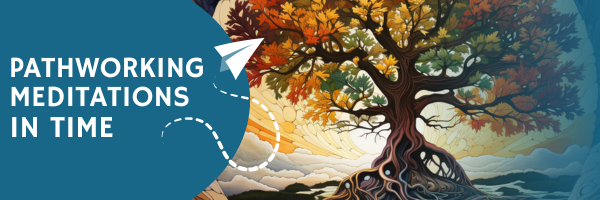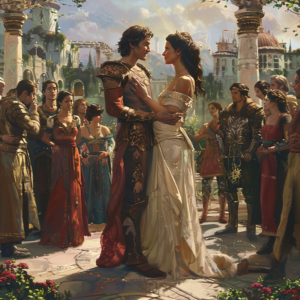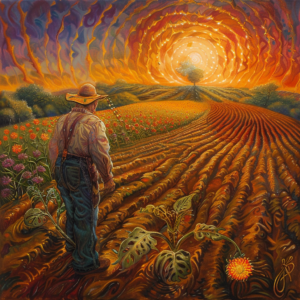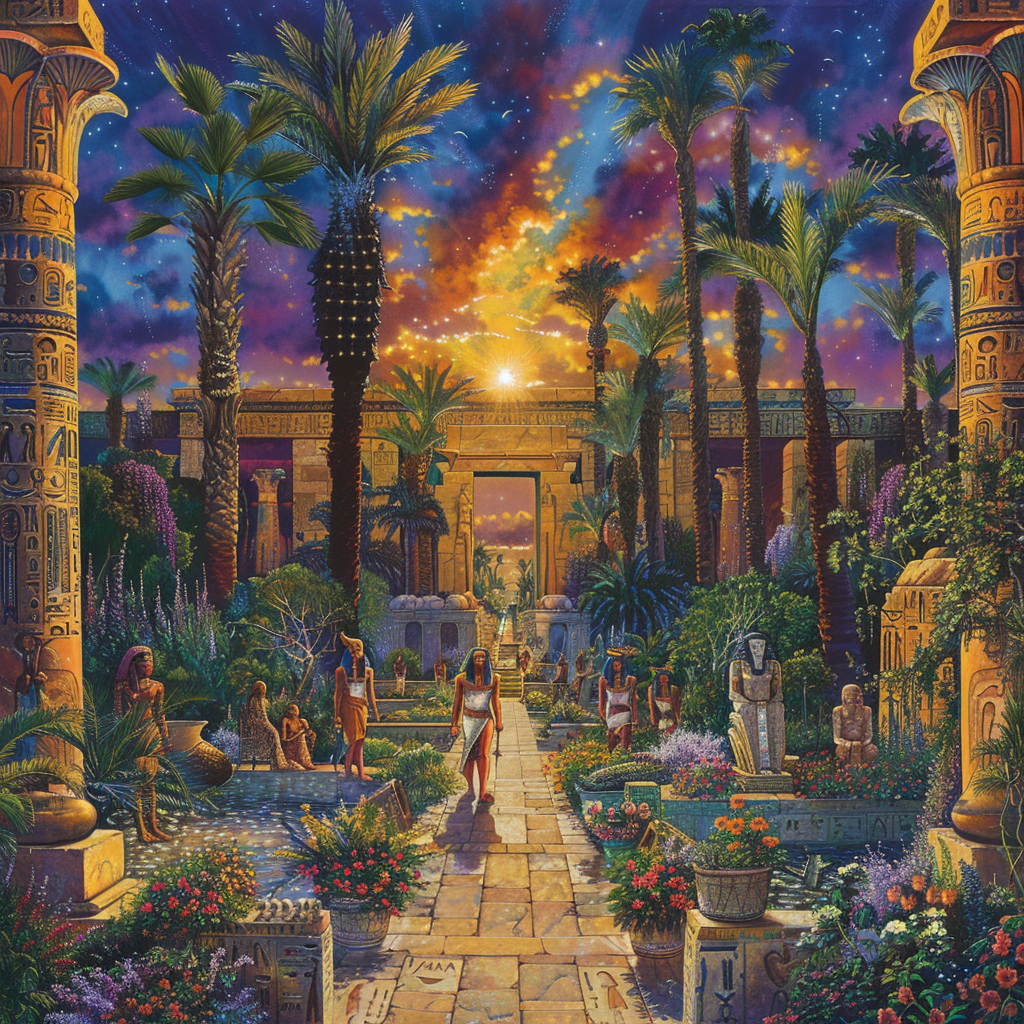
Part 1: The Rise of Defiance
In the opulent halls of my palace, where golden columns rise to touch painted skies, I sit enthroned, a god among men. I am Pharaoh, ruler of the mighty Nile, commander of its waters, and sovereign over its sands. My word is law, my will, the very force that shapes the fate of Egypt. The kingdom’s riches flow into my courts like the river—endless, powerful, eternal.
Yet, amidst this splendor, a murmur has begun to unsettle the still air—the whispers of Moses, who claims to speak for a God unknown, a God of the Hebrew slaves. My advisors bring tales of his audacious demands, speaking with a boldness that borders on blasphemy. “Let my people go,” he says. Such words challenge my reign, a threat to the order that has blessed our land with prosperity.
Why should I, looked upon as a deity, bow to the demands of a foreign God? My heart grows hard with the thought, reinforced by the divine right that is my birthright. I am the living Horus, the falcon whose eyes see the truth of all matters. The Hebrews are but one thread in the tapestry of my kingdom, essential to the workings of my empire.
Tonight, as the stars of Nut arch across the heavens, declaring the glory of Ra’s journey, I walk among the splendors of my gardens, reflecting on the power bestowed upon me. Here, in the company of my beautiful queens and amidst the laughter of my children, the notion of yielding to this Hebrew God seems absurd, unthinkable.
My scribes, eager to capture the glory of my reign, compose songs of victory and strength, hymns that echo through the marbled halls:
“O Pharaoh, the lion of the two lands,
Unyielding as the stone of mountains,
Your enemies falter before your gaze,
Mighty as the Nile, eternal as the sun.”
These poetic praises fortify my resolve. How can one whose rule is celebrated in song and stone falter before threats and plagues? No, I shall stand firm, and Egypt will remain steadfast under my rule.
Part 2: The Unraveling
As days turned into weeks, Moses’s demands became impossible to ignore. Each encounter with him seemed to bring another calamity upon my land, challenging the very core of my authority. Once a source of life and prosperity, the Nile ran red with blood, its waters tainted and unusable. Frogs, lice, and flies descended upon us, turning the air into a cacophony of misery. Yet, I remained resolute, my heart like stone, my resolve unyielding.
“Why should I listen to this Hebrew prophet?” I asked myself, staring into the reflection of my stern gaze in the polished obsidian mirror. “Am I not Pharaoh, the embodiment of the gods on earth?”
My court remained loyal, their eyes reflecting the same confusion and fear that rippled through my soul. The wealth and splendor around me began to feel like a gilded cage, the walls closing in as the plagues intensified. Disease struck our livestock, boils marred the skin of my people, and hail rained with unprecedented fury, destroying crops and hope alike.
Despite these signs, my heart hardened further, a reaction as much born from fear as from pride. Admitting defeat would mean acknowledging a power greater than mine, a deity more potent than the gods of Egypt. The notion was insufferable, inconceivable.
Pharaoh’s Song of Defiance:
“Unyielding stone,
My heart remains Unbowed,
Untouched by distant rains.
The gods of Egypt stand with me
Against this Hebrew deity.”
My advisors and I would gather in the cool chambers of the palace, poring over the symbols and omens, searching for a sign of my ultimate victory. “Pharaoh,” they would say, “stand firm. The gods test your strength. Show no weakness.”
The resolve of my people began to waver, but I remained steadfast, issuing decrees to maintain order and suppress any whispers of dissent. But each night, as I lay in my grand bed, surrounded by luxury, the cries of my suffering people haunted my dreams.
Then came the darkness, a plague so profound it seemed to swallow the very essence of our land. Egypt was shrouded in an impenetrable gloom for three days, a physical manifestation of the turmoil within my soul. I wandered the darkened halls of my palace, questioning the choices that had brought us to this brink.
Internal Conflict:
“Why do you resist?” a voice within me whispered, but I silenced it with thoughts of pride and power. I am Pharaoh. I cannot yield.
But the final blow was yet to come. The night the angel of death passed through Egypt, claiming the firstborn of every household, including my beloved son, shattered something deep within me. The wails of grief rose from every corner of my kingdom, a symphony of sorrow that pierced my hardened heart.
Moses’ God had shown His power in ways I could no longer deny. My defiance had cost my people dearly, and the weight of my pride now felt like an unbearable burden.
Part 3: The Fall and the Lesson
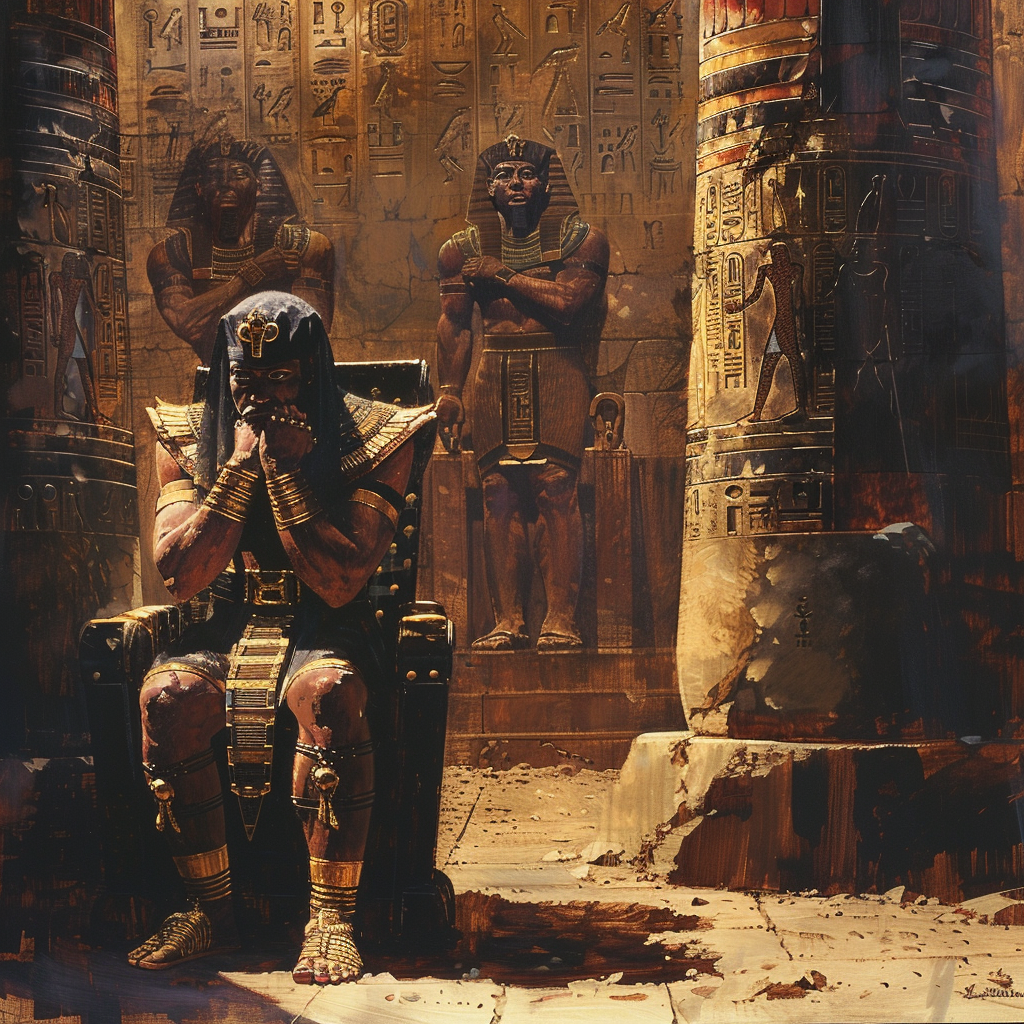
The night my son died, I felt the weight of my pride and defiance crumble beneath the overwhelming sorrow. The gods I had once believed in so fervently seemed distant, their power hollow against the might of this Hebrew God. I summoned Moses and Aaron, my voice a mere shadow of its former strength.
“Go,” I said, the word heavy with grief and resignation. “Take your people and leave my land. Take your flocks and herds, and bless me also.” My kingdom, pride, and defiance—none mattered in the face of such divine wrath. The Hebrews left, their exodus a silent condemnation of my stubbornness and pride.
Yet even in this, my heart was not fully softened. As they departed, a gnawing sense of loss and rage rekindled the embers of my pride. How could I, Pharaoh, let these slaves best me? In a final act of defiance, I sent my chariots to pursue them, hoping to reclaim my fleeting sense of control.
But at the Red Sea, the ultimate miracle unfolded. The waters parted before Moses and his people, creating a path of dry land. My soldiers and I, blinded by pride and anger, followed. The moment the last Hebrew stepped onto the far shore, the waters crashed back, swallowing my army and sealing my defeat.
Pharaoh’s Final Reflection:
As the once-mighty ruler now brought low, I pondered the events that had transpired. My heart, so hardened by pride and power, had led to the ruin of my people and the loss of my son. In the silence, I could hear the echoes of the Hebrews’ songs of freedom and faith.
It was then that I understood the true power of the Hebrew God—not just in the miracles and plagues, but in His people’s unwavering faith and resilience. My heart, once stone, began to crack under the weight of this realization.
Christian Moral Lesson:
The story of my defiance and ultimate downfall is a powerful testament to the dangers of pride and the necessity of humility before divine power. The God of the Hebrews, the God of the Bible, demands acknowledgment, reverence, and submission.
From a Christian perspective, my tale mirrors the biblical themes of redemption and the consequences of hardening one’s heart against God. Just as Pharaoh’s pride led to his downfall, so too does the Bible warn against the perils of rejecting God’s grace.
In the New Testament, Jesus speaks of the hardness of the heart that blinds people to the truth and prevents them from experiencing God’s love and salvation. My story is a cautionary tale—a stark reminder that true power lies not in earthly might but in God’s divine grace.
Message from the God of the Bible:
“Humble yourselves before the Lord, and He will lift you up.”
— James 4:10
“For those who exalt themselves will be humbled, and those who humble themselves will be exalted.”
— Matthew 23:12
The God of the Bible calls all to humility and repentance. My downfall serves as a testament to the enduring truth of these words. In recognizing my errors and submitting to His power, I find a path to redemption that pride had long obscured.
